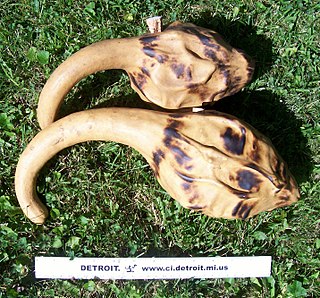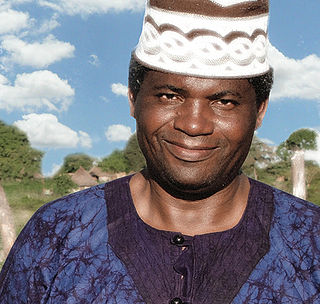Musekiwa Chingodza is a Zimbabwean mbira and marimba player and teacher. He was born in 1970 in Zimbabwe. [1]
Musekiwa Chingodza is a Zimbabwean mbira and marimba player and teacher. He was born in 1970 in Zimbabwe. [1]
Musekiwa Chingodza was born in Mwangara village, Murewa, Zimbabwe, in 1970. He began playing mbira at the age of five and is self-taught. Through listening to other gwenyambira, or great mbira players, he developed a strong attachment to and love for mbira music. He says, "Our music is both medicine and food, as mbira has the power to heal and to provide for people. Mbira pleases both the living and the dead". In 1991, Musekiwa was a key member of the band Panjea, founded by Chris Berry. He composed the hit song "Ganda" on Panjea's Zimbabwean album. Currently Musekiwa teaches mbira at Prince Edward School in Harare. He is a singer, dancer, drummer, and he plays both mbira dzavadzimu and nyunga nyunga. Following up on "Tsunga", his widely acclaimed CD with Jennifer Kyker, Musekiwa released his CD "VaChingodza Budai Pachena". His newest CD, "Kutema Musasa", was released in 2005. [2]
As Musekiwa Chingodza
With Hungwe
With Mhofela
With Steve Spitalny
With Tute Chigamba, Irene Chigamba, and Ngonidzashe Chingodza
With Sumi Madzitateguru

The xylophone is a musical instrument in the percussion family that consists of wooden bars struck by mallets. Like the glockenspiel, the xylophone essentially consists of a set of tuned keys arranged in the fashion of the keyboard of a piano. Each bar is an idiophone tuned to a pitch of a musical scale, whether pentatonic or heptatonic in the case of many African and Asian instruments, diatonic in many western children's instruments, or chromatic for orchestral use.

Mbira are a family of musical instruments, traditional to the Shona people of Zimbabwe. They consist of a wooden board with attached staggered metal tines, played by holding the instrument in the hands and plucking the tines with the thumbs, the right forefinger, and sometimes the left forefinger. Musicologists classify it as a lamellaphone, part of the plucked idiophone family of musical instruments. In Eastern and Southern Africa, there are many kinds of mbira, often accompanied by the hosho, a percussion instrument. It is often an important instrument played at religious ceremonies, weddings, and other social gatherings. The "Art of crafting and playing Mbira/Sansi, the finger-plucking traditional musical instrument in Malawi and Zimbabwe" was added to the UNESCO Representative List of the Intangible Cultural Heritage of Humanity in 2020.

Zimbabwean music is heavily reliant on the use of instruments such as the mbira, Ngoma drums and hosho. Their music symbolizes much more than a simple rhythm, as the folk and pop style styled music was used as a symbol of hope for Zimbabweans looking to gain independence from Rhodesia. Music has played a significant role in the history of Zimbabwe, from a vital role in the traditional Bira ceremony used to call on ancestral spirits, to protest songs during the struggle for independence. The community in Zimbabwe used music to voice their resistance to their oppression, as one of the only weapons they had available to fight back with. In the eighties, the Music of Zimbabwe was at the center of the African Music scene thanks to genres such as Sungura and Jit. However, several performers were banned by state TV and radio leading to the closing of several music venues.

The hosho are Zimbabwean musical instruments consisting of a pair of maranka (mapudzi) gourds with seeds. They are used as major instruments in many traditional Shona music genres, such as in mbira ensembles and in mhande. They typically contain hota seeds inside them. Before the hota seeds are added, the hosho is boiled in salted water and the inside is scraped out with a corncob, newspaper plug, or woven wire. Removing the debris inside the hosho allows for a more sharp and percussive tone.
Shona music is the music of the Shona people of Zimbabwe. There are several different types of traditional Shona music including mbira, singing, hosho and drumming. Very often, this music will be accompanied by dancing, and participation by the audience. In Shona music, there is little distinction between the performer and the audience, both are often actively involved in the music-making, and both are important in the religious ceremonies where Shona Music is often heard.
Ephat Mujuru (1950–2001), was a Zimbabwean musician, one of the 20th century's finest players of the mbira, a traditional instrument of the Shona ethnic group of Zimbabwe.
Abraham Dumisani Maraire, known to friends as "Dumi", was a master performer of the mbira, a traditional instrument of the Shona ethnic group of Zimbabwe. He specialized in the form of mbira called nyunga nyunga, as well as the Zimbabwean marimba. He introduced Zimbabwean music to North America, initiating a flourishing of Zimbabwean music in the Pacific Northwest that continues into the 21st century.

The Shona people are a Bantu ethnic group native to Southern Africa, primarily Zimbabwe. They have five major clans.

Stella Chiweshe is a Zimbabwean musician. She is internationally known for her singing and playing of the mbira dzavadzimu, a traditional instrument of the Shona people of Zimbabwe. She is one of the few female players of the instrument, which she learned to play from 1966 to 1969 when even fewer females played the instrument.

In Zimbabwean Shona music, a deze is a halved calabash gourd that an mbira is placed into to amplify its sound. It is typically round and has bottle caps, shells or other objects strung around its perimeter to vibrate with the mbira, creating a buzzing sound. Cracked deze frequently are repaired by wire stitching. Because of the size of the deze, audience members cannot see the mbira players' hands. Because of this, it is not uncommon for those who want to learn the mbira to play the hosho first, so that they can stand behind the players to see into deze and learn by observation. Modern deze are often constructed out of fiberglass and epoxy for increased durability. However, some mbira players, like Chartwell Dutiro, critique the use of fiberglass dezes in live performance. Dutiro says it compromises the resonance of the mbira and thus hinders communication with dza vadzimu.

Cosmas Magaya was a Zimbabwean mbira musician.

Hugh Travers Tracey was an English ethnomusicologist. He and his wife collected and archived music from Southern and Central Africa. From the 1920s through the 1970s, Tracey made over 35,000 recordings of African folk music. He popularized the mbira internationally under the name kalimba.
Paul Franklin Berliner is an American ethnomusicologist, best known for specializing in African music as well as jazz and other improvisational systems. He is best known for his popular ethnomusicology book on the Zimbabwean mbira, The Soul of Mbira: Music and Traditions of the Shona People of Zimbabwe, for which he received the ASCAP Deems Taylor Award. He also published Thinking in Jazz: The Infinite Art of Improvisation for which he received The Society of Ethnomusicology's Alan Merriam Prize for Outstanding Book in Musicology. Berliner received his Ph.D. from Wesleyan University.
Chartwell Shorayi Dutiro was a Zimbabwean musician, who started playing mbira when he was four years old at the protected village, Kagande; about two hours drive from Harare, where his family was moved by the Salvation Army missionaries during the Chimurenga. Even though the missionaries had banned traditional music, he learned to play from his brother and other village elders. His mother also encouraged him through her singing of traditional songs.

Andrew Tracey is a South African ethnomusicologist, promoter of African music, composer, folk singer, band leader, and actor. His father, Hugh Tracey (1903–1977), pioneered the study of traditional African music in the 1920s–1970s, created the International Library of African Music (ILAM) in 1954, and started the company African Musical Instruments (AMI) which manufactured the first commercial kalimbas in the 1950s.

Forward Kwenda is a mbira performer from Zimbabwe. He was born in the rural Buhera area in Manicaland, an area known for its fierce resistance to colonial rulers and respect for Shona tradition. As a young boy, Forward excelled in traditional dance and recitation of ancient poetry. At the age of 10, he began to play ngoma (drums) and hosho for his mother's gombwe (rain-making) spirit. He was given the name "Forward" because of his curiosity about many subjects, enthusiastic involvement in many activities and his performances for guerrilla forces during the Rhodesian Bush War.

Chris Berry is an American singer, songwriter, and musician. He plays the mbira and the ngoma drum, from the Shona people of Southern Africa. His records with the band Panjea have gone platinum in Zimbabwe and Mozambique. He has released over a dozen albums; scored the soundtrack for three films; and collaborated and performed with many other artists.

Chiwoniso Maraire was a Zimbabwean singer, songwriter, and exponent of Zimbabwean mbira music. She was the daughter of Zimbabwean mbira master and teacher Dumisani Maraire. Describing the mbira, an instrument traditionally used by male musicians, she said, "It is like a large xylophone. It is everywhere in Africa under different names: sanza, kalimba, etc. For us in Zimbabwe it is the name for many string instruments. There are many kinds of mbiras. The one that I play is called the nyunga nyunga, which means sparkle-sparkle."
Jonah Sithole (1952–1997) was a Zimbabwean guitarist, vocalist and composer, known particularly for the mbira-inspired style known as mbira-guitar or chimurenga music.